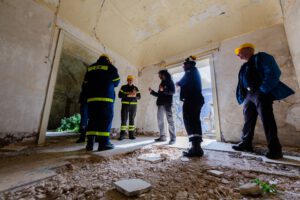
MEMBERS-IN-TRAINING
Frequently Asked Questions
I’m currently a student. When do I apply for the MIT program?
If your bachelors degree is from a Canadian University you can apply for the MIT program. In fact, you can apply for the MIT program as soon as you have completed all courses for your degree. You do not have to wait until your graduation ceremony. However, if you do apply before your graduation ceremony, please ensure that you ask your Registrar’s office to include a letter with your transcript stating that you are graduating.
What is a Competency Based Assessment (CBA)?
APEGNB has adopted the Competency Based Assessment (CBA) model to evaluate the experience qualifications of those applying to APEGNB to become licensed. The CBA framework assesses if the applicant has achieved the necessary competencies for professional licensure while obtaining the required 48 months’ experience. This includes a self-assessment by the applicant, followed by validator (supervisor) review and then evaluation by independent professional assessors.
The framework has been increasingly adopted by regulators across the country as a way to improve transparency and fairness for applicants, as well as ensuring protection of the public.
What is the difference between MIT and EIT/between MIT and GIT? Which one should I use?
Member-in-Training (MIT) refers to all enrolled members-in-training with APEGNB. Engineer-in-Training (EIT) may only be used by engineering discipline MITs, and Geoscientist-in-Training (GIT) may only be used by geoscience discipline MITs. Both disciplines may use Member-in-Training (MIT).
Is the MIT Program mandatory in New Brunswick?
No, the MIT program is not mandatory in New Brunswick. However, there are many benefits to being enrolled as an MIT, such as access to the Competency-Based Assessment portal as you progress through your work experience. You can use the “Interim Validation” function to validate your work experience as you go, rather than having to submit it all when you apply for P.Eng./P.Geo.
This helps to prevent future issues, such as learning the work you are doing (or have done) does not qualify as professional experience, that your supervisor has forgotten who you are, or that your supervisor is no longer available to speak on your behalf.
The MIT Program also demonstrates to potential employers you are academically qualified and on your way to professional status, as required by the Engineering and Geoscience Professions Act of New Brunswick. As an MIT, you have access to opportunities to network with professionals in your field through the Association and your local branch.
How do I record my pre-grad work experience?
Engineering and geoscience related work experience gained prior to graduation can be submitted for review to the Board of Admissions once you are enrolled in the Member-in-Training program provided that:
- The engineering or geoscience work experience is completed AFTER the mid-way point of your degree (that is, after you have completed half of your degree course load).
- The engineering or geoscience work experience MUST be attested to by your supervising Professional Engineer or Professional Geoscientist during the work term. It is not necessary that the PEng or P.Geo be registered with APEGNB as long as they are registered with an engineering/geoscience association. If the PEng / PGeo is registered elsewhere, please have him / her stamp off your work with their engineering or geoscience stamp; and
- Up to 12 months of pre-grad experience can be credited towards the work experience requirement.
I’m an MIT in another province/territory. Can I transfer to New Brunswick when I move here?
You cannot transfer an MIT membership to APEGNB. You will need to start a new application with APEGNB. However, APEGNB will consider any previous experience obtained in other provinces or territories.
I am not yet registered with APEGNB. Can I call myself an engineer/geoscientist?
Only registered members or licencees may practise engineering or geoscience independently in New Brunswick. In order that the public can be assured that qualified individuals are practising, only registered members or licencees can use the following titles, designations, or abbreviations:
- Engineer/Geoscientist
- Professional Engineer/Professional Geoscientist
- Eng/Geo
- P.Eng./P.Geo.
Only those recorded in the Member-in-Training Program with APEGNB may use the following titles or abbreviations:
- Member-in-Training/Engineer-in-Training/Geoscientist-in-Training
- MIT/EIT/GIT
Titles for MITs such as Junior Engineer, Graduate Engineer, Assistant Geoscientist are not acceptable.
It is acceptable to denote a university degree following your name (e.g. “B.A.Sc.”, “B.Sc.Eng.”, “B.Sc.”, etc.).
I am an international applicant. What is the process to apply?
If your bachelors degree was obtained outside of Canada you would first have to undergo an academic assessment. For this we will also need a course by course WES report.
Make sure you request the Comprehensive Course by Course Report (ICAP) which:
- Identifies, describes and provides a Canadian equivalency for each credential
- Lists all subjects with their corresponding credits, grades and a calculated GPA expressed in Canadian terms
- Appropriate for admission to higher education, professional licensing or any other purpose where a detailed course analysis is required
Your WES report must be sent to APEGNB directly from WES. You will be able to select APEGNB from a list of recipients.
Depending on what the Examinations committee decides you may need to write confirmatory exams, depending on if, and how many they decide on, it could take several years to write these as they are only held twice a year. You can find more information here: First-Time Applicant in Canada, Internationally Trained or Other – APEGNB
